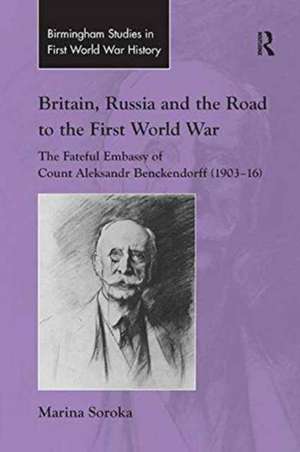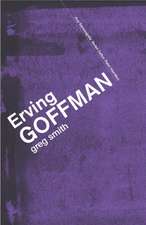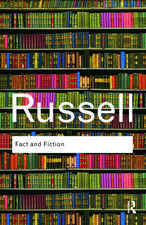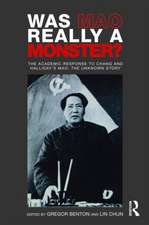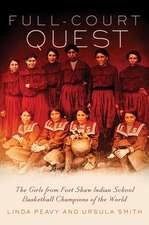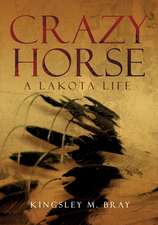Britain, Russia and the Road to the First World War: The Fateful Embassy of Count Aleksandr Benckendorff (1903–16): Routledge Studies in First World War History
Autor Marina Sorokaen Limba Engleză Paperback – 15 noi 2016
| Toate formatele și edițiile | Preț | Express |
|---|---|---|
| Paperback (1) | 489.26 lei 6-8 săpt. | |
| Taylor & Francis – 15 noi 2016 | 489.26 lei 6-8 săpt. | |
| Hardback (1) | 1119.45 lei 6-8 săpt. | |
| Taylor & Francis – 28 apr 2011 | 1119.45 lei 6-8 săpt. |
Din seria Routledge Studies in First World War History
-
 Preț: 316.13 lei
Preț: 316.13 lei -
 Preț: 310.36 lei
Preț: 310.36 lei -
 Preț: 330.34 lei
Preț: 330.34 lei - 18%
 Preț: 836.89 lei
Preț: 836.89 lei -
 Preț: 489.26 lei
Preț: 489.26 lei - 21%
 Preț: 255.40 lei
Preț: 255.40 lei -
 Preț: 390.63 lei
Preț: 390.63 lei -
 Preț: 469.34 lei
Preț: 469.34 lei - 17%
 Preț: 259.98 lei
Preț: 259.98 lei - 18%
 Preț: 995.58 lei
Preț: 995.58 lei -
 Preț: 384.70 lei
Preț: 384.70 lei -
 Preț: 491.17 lei
Preț: 491.17 lei -
 Preț: 416.63 lei
Preț: 416.63 lei - 18%
 Preț: 1056.80 lei
Preț: 1056.80 lei - 18%
 Preț: 998.71 lei
Preț: 998.71 lei -
 Preț: 469.34 lei
Preț: 469.34 lei -
 Preț: 386.39 lei
Preț: 386.39 lei -
 Preț: 469.34 lei
Preț: 469.34 lei - 15%
 Preț: 305.52 lei
Preț: 305.52 lei -
 Preț: 469.34 lei
Preț: 469.34 lei - 12%
 Preț: 299.52 lei
Preț: 299.52 lei -
 Preț: 384.86 lei
Preț: 384.86 lei - 25%
 Preț: 824.80 lei
Preț: 824.80 lei - 18%
 Preț: 1059.93 lei
Preț: 1059.93 lei - 18%
 Preț: 1000.27 lei
Preț: 1000.27 lei -
 Preț: 489.26 lei
Preț: 489.26 lei - 18%
 Preț: 1110.47 lei
Preț: 1110.47 lei - 18%
 Preț: 1000.30 lei
Preț: 1000.30 lei - 21%
 Preț: 256.32 lei
Preț: 256.32 lei - 21%
 Preț: 216.07 lei
Preț: 216.07 lei - 26%
 Preț: 820.32 lei
Preț: 820.32 lei
Preț: 489.26 lei
Nou
Puncte Express: 734
Preț estimativ în valută:
93.63€ • 97.39$ • 77.30£
93.63€ • 97.39$ • 77.30£
Carte tipărită la comandă
Livrare economică 14-28 aprilie
Preluare comenzi: 021 569.72.76
Specificații
ISBN-13: 9781138261204
ISBN-10: 1138261203
Pagini: 336
Dimensiuni: 156 x 234 x 24 mm
Greutate: 0.45 kg
Ediția:1
Editura: Taylor & Francis
Colecția Routledge
Seria Routledge Studies in First World War History
Locul publicării:Oxford, United Kingdom
ISBN-10: 1138261203
Pagini: 336
Dimensiuni: 156 x 234 x 24 mm
Greutate: 0.45 kg
Ediția:1
Editura: Taylor & Francis
Colecția Routledge
Seria Routledge Studies in First World War History
Locul publicării:Oxford, United Kingdom
Cuprins
Contents: Preface; The premises, 1830-1900; Old diplomacy à la russe, 1868-1902; The new ambassador and his objectives 1902-1904; The Russo-Japanese war 1904-1905; The Anglo-Russian rapprochement, 1905-1907; The school of compromise 1907-1908; Balance abandoned 1908-1910; Waiting for an August war 1910-1913; The price of an alliance 1914-1917; Conclusion; List of characters; Bibliography; Index.
Recenzii
'Among all the great powers in 1914, the foreign policy of Russia has been the least effectively researched. This is partly because Russian diplomatic and military archives were closed to foreign historians in Soviet times and partly because the study of international relations is unfashionable among Western historians of Russia. Russia’s own historians have only closed the gap to a limited extent, and few Western historians of the First World War can read Russian anyway... Marina Soroka’s Britain, Russia and the Road to the First World War is particularly rich in this respect, drawing not just on official papers in the Russian archives but also on valuable private correspondence from both Russian and foreign sources.' Times Literary Supplement ’... Soroka has produced a fine book, densely sourced and well-written ... She deftly weaves a vast range of sources into a coherent and polished narrative. ... Soroka has helped to illuminate a critical diplomatic relationship that was pivotal in shaping international politics in the early years of the twentieth century. She has used a huge range of archival sources to reveal aspects of her story that have not hitherto been told. Her story is told with a fluency and direction that is hard to achieve when dealing with such a mass of material. Soroka has above all raised points that should encourage every student of the period to rethink both the nature of Anglo-Russian relations and its place in the wider diplomatic environment. She has in short written a very valuable and well-researched book.’ Diplomacy & Statecraft 'With access to his family papers, and displaying a fine command of a wide array of unpublished and published sources, Soroka has produced a meticulously researched, richly detailed account of Benckendorff’s life and career... While this book will primarily appeal to scholars of international relations and diplomacy on the eve of the Great War, any reader will benefit from this glimpse into the world
Descriere
This book demonstrates the role of Count Aleksandr Benckendorff, the Russian ambassador in London between 1903 and 1916, in setting Russia on the road to war. Fearing the loss of Britain's friendship, he opposed all Russia's efforts at improving Russo-German relations and when the Sarajevo crisis struck, there was now no hope of appealing to German goodwill to help defuse the situation. Instead Russia's status within the Entente depended on a show of determination and strength, which lead inexorably to a disaster of the Great War.
